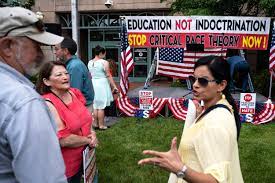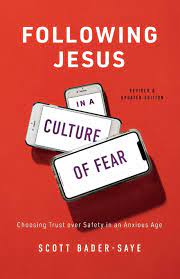Fear shows itself in many ways. Fear shows itself honestly, prompting us to pull back, to cautiously evaluate an unclear situation before moving forward. Fear may also show itself dishonestly, as false bravado or misplaced aggression. Fearful people lash out. Fear also prompts us to do something unwise and against good reason simply “because I can.”
We see this in our legislators these days. “Because we can” seems to be the motivation behind a number of recent actions taken by our state legislature and our governor.
 In the past few months, for example, Texas legislators have taken reproductive choice away from women and put enforcement of the law in the hands of vigilantes, a law that even a majority of Texans oppose. They outlawed the teaching of Critical Race Theory, which of course, is not taught in our school. School library books that address sex, sexual orientation, or race in ways that some white parents find uncomfortable are now subject to banning, Students who identify as transgender who wish to participate in sports and in some cases simply want to go to the bathroom are ongoing targets of our leaders.
In the past few months, for example, Texas legislators have taken reproductive choice away from women and put enforcement of the law in the hands of vigilantes, a law that even a majority of Texans oppose. They outlawed the teaching of Critical Race Theory, which of course, is not taught in our school. School library books that address sex, sexual orientation, or race in ways that some white parents find uncomfortable are now subject to banning, Students who identify as transgender who wish to participate in sports and in some cases simply want to go to the bathroom are ongoing targets of our leaders.
Voting has been ingeniously restricted, rooting out fraud that never existed, and district lines have been redrawn to insure reelection of those in power. Meanwhile, our governor, not wanting to be left behind in the stampede to the extreme right, continues to forbid any organization from mandating masks or vaccinations despite their clear public health benefit.
“Because we can” seems the logical explanation for these regressive policies, but I suspect there is fear at work here; fear on the part of the legislators and fear of the parents they are trying to appease.
When we feel physically threatened, our bodies engage physiological reactions that help us focus our attention on the perceived threat and prepare us to react. We become vigilant and self-protective. These are evolutionary protective measures humans have developed over the millennia. A similar phenomenon happens when we perceive threat in our social or cultural world. Our worldview narrows and we react with suspicion toward those we perceive as a threat.
What is the threat prompting these punitive actions? What is the fear of entrusting reproductive choice to the women who are most impacted by the choice? What is the threat to the parents of the schools teaching issues related to our country’s racial history? Why must we ban books from school libraries that explain and depict far less than what the children have likely seen at home on the internet? Do parents and legislators fear that children will become promiscuous or change sexual orientation if given information? Wouldn’t some conversation or education for students and parents be preferable?
When we get scared of what might happen, some future evil, we pull inward as individuals and as a group. We become more self-protective. What is the future evil behind these legislative decisions? Loss of power and privilege. White men (like I am) have held power throughout our nation’s history. Allowing women to make their own health care choices, acknowledging racial injustice enforced those of us in power over the decades, making room for people of a different sexual orientation, and the many other ways our culture is changing can be terrifying for those comfortably in power.
 Theologian Scott Bader-Saye suggests that fear fosters a set of “shadow virtues,” including suspicion, preemption, and accumulation. These are counter to traditional Christian virtues such as hospitality, peace-making, and generosity. When fearful, we are tempted to make safety our highest moral good, leaving little room for concern for others or decisions that foster good and healthy relationships.
Theologian Scott Bader-Saye suggests that fear fosters a set of “shadow virtues,” including suspicion, preemption, and accumulation. These are counter to traditional Christian virtues such as hospitality, peace-making, and generosity. When fearful, we are tempted to make safety our highest moral good, leaving little room for concern for others or decisions that foster good and healthy relationships.
These issues that frighten legislators and parents are not simple. These are complex and personal issues that deserve all the thought, study, and compassion we can bring to them. Not needed are one-size-fits-all policies from legislators or school boards under pressure from angry/frightened constituents. What is needed is a cooling of the rhetoric so we can gather and talk, identify and address the fear that underlies the anger and defensiveness.
As part of the white culture, I have choices. I can become a constructive member of our nation’s increasingly pluralistic society, I can retreat in fear, or I can react with anger. Our country and our world are becoming more diverse. This is the reality. We as a nation can embrace this reality, open our eyes, our minds and our hearts to it, or we can get angry and restrictive.
0 Comments until now
Add your Comment!